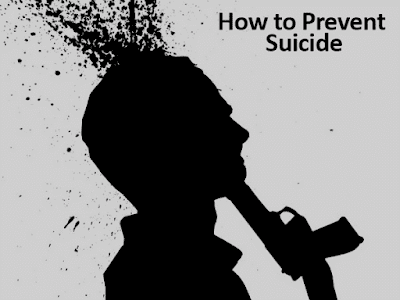How to Prevent Suicide
How to Prevent Suicide
British weapons inspector was
found dead after cutting his wrist in the forest. In recent weeks, he has been
involved in a dispute over the Iraq war.
In the urban and rural areas, not
much more suicides go unnoticed. Through local rumor mills and city newspapers,
suicide is a sad story and mystery.
Why kill people?
Recent studies have that the
correlation between suicide and serotonin deficiency in the brain shown.
Moreover, the consequences of the presence of significant stress profound
especially if such stressor, such as legal issues arising. In deep despair and
depression often when there is no immediate solution to the problem, suicide is
an attractive escape.
It is clear that suicide is not
only a medical disorder but a psychosocial problem. It is more than a
manifestation of emotional distress. It is a complication of an undissolved
state.
There is no question that suicide
is devastating to everyone. I saw struggling families with the pain and loss
associated with the manner of death of shame. The pain and grief of the parents
persist for months despite efforts to feel better than counseling and drugs.
Can suicide be prevented?
Suicide prevention is both
science and art. Although scientific psychotherapeutic techniques can be the
effective application, makes the noble art of death person treating the
difference.
This being said, if indicators of
suicidal behavior can be recognized early and sources of stress addressed
immediately, then the risk of suicide can be reduced. The issue of early
detection and treatment is, therefore, crucial. Help in the center of attention
with their families cope.
Whichever approach pursued CARE?
CARE Approach is a process of
four practical steps that can make a person in the treatment of a disease such
as suicidal behavior and depression. This approach focuses on the detection and
early intervention. The early process includes the following: 1) determine
whether there is evidence of mental illness 2) Anticipate complications 3)
Remedy with early intervention and 4) educate about the disease.
If signs of illness or emotional
stress
Suicide, like any medical
disorder, does not happen immediately, or "out of nowhere". It is
usually preceded by emotional disorders such as depression, agitation,
significant anxiety, impulsivity, feelings of hopelessness and helplessness.
Search outward signs that the
deviation from the same person always shows. Note any changes in operation. Is
the person less motivated to work? Does the person stay in bed and withdraw
from friends and family members? Also check the existence of sleep
physiological changes such as the inability to eat and to concentrate.
Anticipating complications
Look out for complications once
you know your loved one is in danger. Pay attention to changes such as suicidal
behavior and murder and assault. If the actual destructive behavior does not
appear, ask for thoughts of death or wanting to die or to kill.
Questions about the presence of
suicidal or homicidal thoughts are not to act your loved one slide be
destructive. In fact, you may be encouraged your loved one to give more information
and emotions express well maintained.
Remedy with early intervention
Early intervention requires first
accept or acknowledge that a problem exists and to solve the urgent need. To be
in denial can only make matters worse. Denial interferes further problem
recognition.
Assistance to meet their most
pressing problems being. Bidding to grant financial support or appropriate
authorities to contact. For someone in legal trouble, suggest obtaining the
advice of a good lawyer.
Standing and supportive disposal.
Reassure your loved ones that you will be on your side, no matter what happens.
Let them talk about their worries and troubles. Enter a sympathetic ear. Avoid
arguments and criticisms. Empathize.
Be looking for signs of
destructive, such as wrist slashing overdosing, verbalizing death, agitated
behavior, to change the letter or a will conduct, and giving properties. When you’re
loved one is in danger, to clarify whether it has entertained destructive
thoughts.
Call for help. Because the
murderer and suicide behavior requires immediate help, further delay is not an
option. Call the hotline mental health, mental health services, or emergency
room for advice and ask for the next step. Do not hesitate to call law
enforcement or a team of mental health crisis if you denied your loved one to
get help.
Educated Yourself
The knowledge about the disease,
back and not do, and the best way to cope is a powerful way to deal with
suicide or other destructive behavior. Moreover, the formation of
misunderstandings helps get rid of guilt, guilt, and shame.
In summary, suicide, like cancer,
has only one aim - death. It has led to torment, sleepless nights and oceans of
tears for those who were left behind. However, despite its deadly intentions,
suicide is also a cry for help. Fortunately, simple measures such as care
approach make suicide surmountable.











